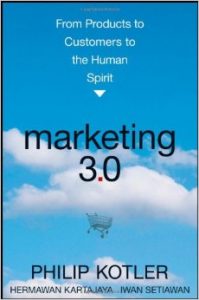Why Now Is The Time To Differentiate Through Thought Leadership
My friend Karin Wiberg wrote a great post about the term thought leadership. Some people feel this term is overused and even abused. While there is some truth to these concerns, we should not abandon or ignore this important concept.
 As Karin does so well, she clearly outlines two different definitions of thought leadership:
As Karin does so well, she clearly outlines two different definitions of thought leadership:
- The marketing definition refers to free reports, webinars, videos and the like that organizations or individuals with specific expertise produce. You’ve seen this stuff: white papers on industry best practices, analyses of market trends, strategic insights on the latest hot topic. The idea is that sharing their perspective will benefit others, including potential clients.
- The influence definition also includes expertise, but takes things further. Denise Brosseau, CEO at Thought Leadership Lab and author of Ready to Be a Thought Leader?, describes thought leadership as offering innovative ideas, turning those ideas into reality, and demonstrating how to replicate that success into sustainable change across an industry, niche, or ecosystem. As she puts it, “Thought leadership is not about being known. It is about being known for making a difference.”
Not surprisingly, Karin is a fan of the second definition. I am too, and the reason can be found in the brilliant statement Karin highlights at the end of #2:
“Thought leadership is not about being known. It is about being known for making a difference.”
Making a difference is not about fluff or fame. Making a difference is about leadership.
As John Maxwell states, “Leadership is influence. Nothing more, nothing less.” It takes a leader that sees what needs to change and to influence others to help make it a reality.
It also takes a leader to identify and develop the values that will make a difference – what I call Differentiating Values. This requires thought leadership.
Thought Leadership and Differentiating Values
When the leader of an organization identifies and develops the Differentiating Values, it sets the strategic direction that will ultimately make a difference.
- This is how Tony Hsieh changed the world of online retail by delivering WOW through service at Zappos.
- This is how social entrepreneur Blake Mycoskie built TOMS Shoes into an amazing company that fulfills a global mission of improving lives.
- This is how the founders of Warby Parker (Neil Blumenthal, Andrew Hunt, David Gilboa, and Jeffrey Raider), built their socially conscious business where the company donates a pair of prescription glasses for every pair that customers buy.
Hsieh, Mycoskie, Blumenthal, Hunt, Gilboa, and Raider can all be considered thought leaders. They are now known for making a difference. Did these entrepreneurs clearly define their values when they started out? No. But their decisions and behaviors were aligned with their values in such a way that others could recognize and identify with them. They consistently and persistently talked about their vision and values until they were finally formalized.
It is Differentiating Values that help such leaders build values-based organizations. This includes building a strong, impactful, and lasting brand.
Such values become part of the fabric of the organization. They inject value into all products and services, create value for customers, drive the value of reward programs for employees and volunteers, deliver value to the community, build brand value and ultimately increase shareholder value.
 As marketing guru Philip Kotler wrote in his book Marketing 3.0
As marketing guru Philip Kotler wrote in his book Marketing 3.0:
- “Supplying meaning is the future value proposition in marketing. The values-driven business model is the new killer app in Marketing 3.0.”
- “It is about companies weaving values into their corporate culture.”
- “Differentiation is the brand DNA that reflects the true integrity of the brand. ”
We live in a world where business strategy has shifted from being product-focused to customer-focused and now to values-focused.
It is time for leaders of organizations to stand up and clearly state what they want to be known for and the difference they want to make.
Now is the perfect time to be become a thought leader – and claim your Differentiating Values.
Lastly, as Karin ends in her post, don’t underestimate the role of thought leadership materials—including books. And if you need help telling your story as a thought leader, I encourage you to contact Karin as this is where she is known for making a difference.
———————-
Note: This is NOT a sponsored post. Neither Karin nor anyone else had any prior knowledge of my plans to write this article.









